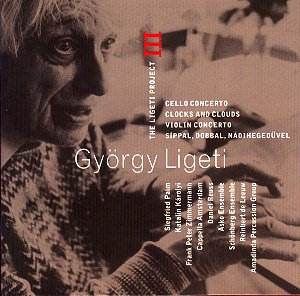This is the very latest release in Teldec’s excellent,
hopefully ongoing, series entitled The Ligeti Project. It follows
the intelligent programming formula of the previous two, in that it
couples well-known major works with premiere recordings of new or lesser-known
pieces.
The biggest and most performed item on the disc is
undoubtedly the Violin Concerto. This is a magnificent work,
one of the most important concertos of the last decade. Some critics
have found its volatile aural world to reflect Ligeti’s abiding interest
in Shakespeare’s The Tempest, and the parallel is not a fanciful
one. It is an excellent example of what has become known now as his
‘late’ style, following as it did a period of illness and compositional
crisis. Like many of the older generation of avant-gardists, Ligeti
rediscovered a kind of tonality and metre, albeit one which is lopsided
or dislocated to disturbing (or even comic) effect. This concerto offers
the listener the best illustration of this new concern for ‘wayward
intonation’, where some instruments in the chamber orchestra are re-tuned
to natural harmonics. Add to the mixture the evocative timbres of recorders
and ocarinas (a favourite sound in later Ligeti), and the resulting
‘haze of intonation’ gives a beguiling combination of clarity and sheer
weirdness – try 2’50 into the Aria second movement. The whole
piece is as inventive and approachable as anything in his output, and
has already been well served on disc. The marvellous, award-winning
DG disc from Boulez, featuring the work’s dedicatee Sashko Gawriloff,
is very fine, though the big-boned playing of Frank Peter Zimmerman
brings out the Romantic overtones to even greater effect. He is superbly
partnered by de Leeuw, who also seems happy to underline those parallels
with the great concertos of the past. An intoxicating experience.
That Boulez DG disc also includes a marvellous performance
of the Cello Concerto, a work dating from 25 years earlier and
inhabiting a very different aural landscape. Here, the composer’s early
fascination with shimmering ‘cloud textures’ is heard to real advantage,
along with a subtle and original use of the solo instrument. This new
Teldec version features the great Siegfried Palm, a close collaborator
of Ligeti over the years and the artist for whom it was written. This
is his third recording, and though I cannot comment on the other two,
I simply cannot imagine they are any more virtuosic or imaginative than
this one. Palm obviously knows the score inside out, and his fine gradations
of tone colour are amazing, from the imperceptible opening unison E
natural (marked, believe it or not, pppppppp), to the great closing
cadenza, where the cellist is called upon to perform almost superhuman
feats on the instrument. The Dutch players, under their contemporary
specialist conductor, are clearly inspired by the presence of Palm (and,
so we understand, the composer) to give of their very best. The result
is simply as good as it gets.
The remaining items are invaluable. As in Volume 2,
where I could not believe Apparitions was getting its first recording,
so here we have the premiere of a work from 1973 that encapsulated his
whole compositional ethos up to then, the aptly titled Clocks and
Clouds . The piece is scored for 12 female voices and fairly
large chamber orchestra. This allows the composer to exploit to the
full his two favourite structural devices, "exactly determined
(‘clocks’) versus global, statistically measurable (‘clouds’) occurrences
of nature". These are translated into poetic images and then aural
sounds, an utterly hypnotic mixture of iridescent clusters and diffuse,
ever-changing masses of vocal and instrumental texture. It receives
here a stunning performance, all the more effective for being an amazingly
accurate rendition of the composer’s wishes.
The final, and most recent, work is Sippal, dobbal…,
a setting of verses by Sándor Weöres, whom Ligeti describes
as "a unique virtuoso of the Hungarian language … whose countless,
profound and playful short poems I have always turned to for composition".
Seven poems are set, and they form a strange mixture of nature, philosophy
and childish nonsense verse. Couple this with the scoring (mezzo and
four percussionists) and you have what amounts to a quirky vocal entertainment,
short, sweet and diverting, in its own way just as memorable and ingenious
as his large scale works. Texts and translations are included, and though
the nature of two of the poems renders them untranslatable, this will
not spoil your enjoyment. Performances are totally exemplary.
Production values on this third volume are again very
high. The recording has stunning clarity and presence, and authoritative
liner notes are once more by the composer. There is a huge range of
music on offer here, and I’m certain even hardened conservatives will
find something to which they can respond. Very highly recommended.
Tony Haywood
